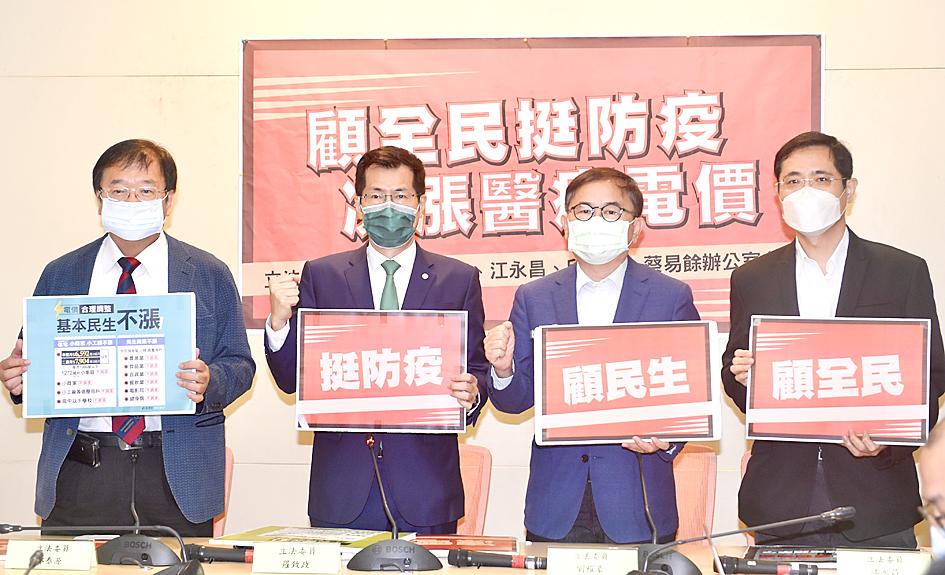Democratic Progressive Party (DPP) lawmakers yesterday called for a moratorium on raising hospital electricity rates.
The call came three days after the Ministry of Economic Affairs raised electricity prices by 8.4 percent for households and 15 percent for heavy users, starting today.
The state-run Taiwan Power Co (Taipower, 台電) said that increasing the rates is necessary to cut the utility’s losses amid soaring global energy prices.

Photo: George Tsorng, Taipei Times
DPP Legislator Lo Chih-cheng (羅致政) said that rates for hospitals should not be changed before the local outbreak of COVID-19 eases.
Much of the electricity used by hospitals is to power lifesaving and indispensable equipment, including life-support systems, scanning equipment and air-conditioners, he told a news conference in Taipei.
Doctors and nurses on the front line of COVID-19 pandemic deserve to work in comfort, without being bothered by power bills, he said.
DPP Legislator Chiang Yung-chang (江永昌) said that it is hard to accept that burdens are being created for hospitals so soon after medical workers helped the nation get through the worst of the pandemic.
The government already exempted a slew of energy consumers from the rate increases, including agricultural and fishing operations, food manufacturers, department stores, restaurants, movie theaters and gyms, he said.
“If you stop an ordinary Taiwanese on the street and ask them which sector should receive an exemption from electricity rate hikes, they would say hospitals before any of the six sectors designated by the Executive Yuan,” he said.
Raising the electricity rates for hospitals would not reduce Taipower’s deficits from years of offering cheap electricity, as hospitals use about 1 percent of the nation’s power supply, he said.
As hospitals have a key role in maintaining public health and the standard of living in Taiwan, they cannot be treated as just another enterprise that happens to use a lot of electricity, DPP Legislator Liu Chao-hao (劉櫂豪) said.
Raising the price of electricity for hospitals could lead to a decline in the quality of medical care received during a COVID-19 outbreak, especially for people living in rural areas, he said.
“Technology allows people to receive high-quality medical care today at the cost of increased electricity consumption,” DPP Legislator and Taiwan Medical Association president Chiu Tai-yuan (邱泰源) said.
Hospitals are already doing all that they can to save electricity, including turning off air-conditioners at offices, but they cannot do so in patients’ rooms, he said.
Operating COVID-19 quarantine wards and specialist care spaces requires a lot of electricity, he said, adding that medical workers appreciate the government’s financial assistance with energy bills in the past two years.
“A moratorium on electricity rate hikes would greatly help hospitals keep quality of care standards,” he said.

The Ministry of Economic Affairs has fined Taobao NT$1.2 million (US$36,912) for advertisements that exceed its approved business scope, requiring the Chinese e-commerce platform to make corrections in the first half of this year or its license may be revoked. Lawmakers have called for stricter enforcement of Chinese e-commerce platforms and measures to prevent China from laundering its goods through Taiwan in response to US President Donald Trump’s heavy tariffs on China. The Legislative Yuan’s Finance Committee met today to discuss policies to prevent China from dumping goods in Taiwan, inviting government agencies to report. Democratic Progressive Party Legislator Kuo Kuo-wen (郭國文) said

The Ministry of Economic Affairs has fined Taobao NT$1.2 million (US$36,900) for advertisements that exceeded its approved business scope and ordered the Chinese e-commerce platform to make corrections in the first half of this year or its license would be revoked. Lawmakers have called for stricter supervision of Chinese e-commerce platforms and more stringent measures to prevent China from laundering its goods through Taiwan as US President Donald Trump’s administration cracks down on origin laundering. The legislature’s Finance Committee yesterday met to discuss policies to prevent China from dumping goods in Taiwan, inviting government agencies to report on the matter. Democratic Progressive Party

Taiwan and its Pacific ally Tuvalu on Tuesday signed two accords aimed at facilitating bilateral cooperation on labor affairs, according to Taiwan’s Ministry of Foreign Affairs (MOFA). The governments inked two agreements in Taipei, witnessed by Foreign Minister Lin Chia-lung (林佳龍) and visiting Deputy Tuvaluan Prime Minister Panapasi Nelesone, MOFA said in a news release. According to MOFA, the agreements will facilitate cooperation on labor issues and allow the two sides to mutually recognize seafarers’ certificates and related training. Taiwan would also continue to collaborate with Tuvalu across various fields to promote economic prosperity as well as the well-being of their

Sung Chien-liang (宋建樑), who led efforts to recall Democratic Progressive Party (DPP) Legislator Lee Kun-cheng (李坤城), was released on bail of NT$80,000 today amid outcry over his decision to wear a Nazi armband to questioning the night before. Sung arrived at the New Taipei District Prosecutors’ Office for questioning in a recall petition forgery case last night wearing a red armband bearing a swastika, carrying a copy of Adolf Hitler’s Mein Kampf and giving a Nazi salute. Sung left the building at 1:15am without the armband and covering the book with his coat. Lee said today that this is a serious